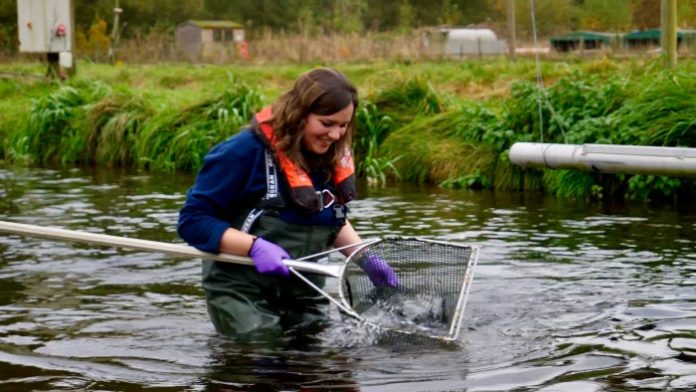“The intention was to build a grassroots network of peer-to-peer support for women, by women, operating in what is still, numerically at least, a male-dominated sector.” – Heather Jones, founder of Women in Scottish Aquaculture (WiSA).
The United Nation’s Food and Agriculture Organization (FAO) has declared 2022 the International Year of Artisanal Fisheries and Aquaculture. The aim is to increase global understanding and support of millions of small-scale fishers, fish farmers and fish workers who provide healthy and nutritious food to billions of people. They play a crucial role in achieving the UN Sustainable Development Goals such as Goal 2: Zero Hunger, contributing to global food security and nutrition, and poverty eradication. Yet, issues of sustainability, equality, and inclusion remain. Many people looking to enter into the sector, women in particular, face numerous challenges in one of the world’s most vulnerable industries.
This month, UNRIC spoke to Heather Jones, founder of Women in Scottish Aquaculture (WiSA) and CEO of the Sustainable Aquaculture Innovation Centre (SAIC), on the challenges and opportunities facing women in Scotland.

What is Women in Scottish Aquaculture (WiSA) and why was the network set up?
WiSA was established on International Women’s Day in March 2019. Initially, I started off the conversations with a group of about a dozen women working in Scottish aquaculture, both in universities and businesses in the sector, who then came up with the idea. We were also informed by the answers to a big survey we conducted amongst sector professionals to see if there was a need and appetite for such an initiative.
What is the aquaculture industry like in Scotland today?
Aquaculture is an increasingly important sector for Scotland, our salmon is the UK’s biggest food export by value and as the world’s appetite for sustainable protein grows, there are wide-ranging opportunities for the sector to expand. Ambitions have already been set out to grow its economic contribution to £3.6 billion by 2030 and support 18,000 jobs – many of which are in rural areas.

What are some of the main challenges for women working in aquaculture in Scotland?
Many of the challenges women face in the industry are the same as for men – learning new skills to handle boats and fish, working as part of a team, contributing from a place of self-confidence. Others are issues that women perhaps are expected to juggle or make do with, for example taking a key role in elderly parent care, taking a career break to have and raise children, managing the domestic household, or putting up with equipment that was designed for an average (male) person and not an average female person.
How does WiSA help women overcome some of these challenges?
We’ve organised farm visits; training courses covering confidence, productivity and interview skills; networking sessions; and informal gatherings. We’ve shared job vacancies across the network, and have offered members the opportunity to join innovation training programmes. We also run a series of interviews where key figures from the sector, both male and female, share their experiences and advice with the community. WiSA, along with the SAIC, have just launched a second coaching and support programme funded by the Scottish Government. The mentoring scheme aims to match some of the most influential leaders in aquaculture with aspiring women in the sector looking to develop their careers and skills.

How does WiSA support sustainability in the aquaculture sector?
Many WiSA members are passionate about sustainability, including the sustainability of the sector they work in where businesses add value, deliver food for a hungry planet, turn a profit to reinvest in Scotland, and share the benefits with local communities. WiSA members work in a wide range of roles, from research and processing to securing fish health and wellbeing and growing seaweed. It’s a sector everyone can be proud of.
How has WiSA made an impact on the aquaculture sector in Scotland?
In just three years the WiSA network has grown significantly, and we would like to think that everyone working in the Scottish aquaculture sector is now familiar with what we are trying to achieve. Our focus is on raising awareness of the benefits of diversity and equality, and while cultures and attitudes cannot change overnight, we have seen some great progress made through the likes of recruitment approaches, parental leave policies and gender pay gap reporting.

What are the future aims of WiSA?
WiSA’s future aims are to continue to develop the network, offer new and exciting training programmes, keep promoting the sector to new entrants, work with businesses to support everyone in aquaculture, and see an equal number of women and men working in a thriving, sustainable sector. For WiSA, the International Year of Artisanal Fisheries and Aquaculture is an excellent opportunity to promote the sector and the women working in it.

Additional Links:
To find out more about WiSA, visit https://wisa.sustainableaquaculture.com.




